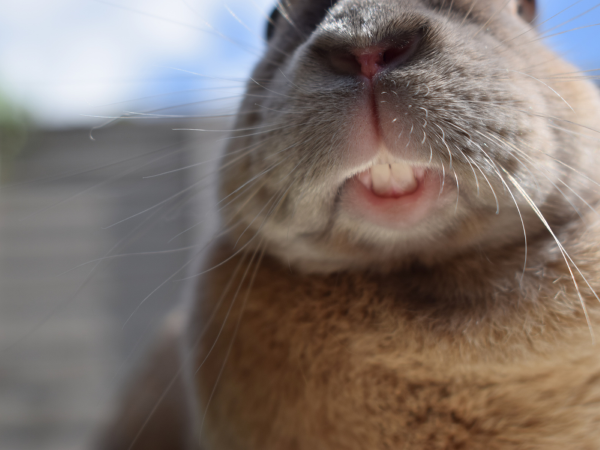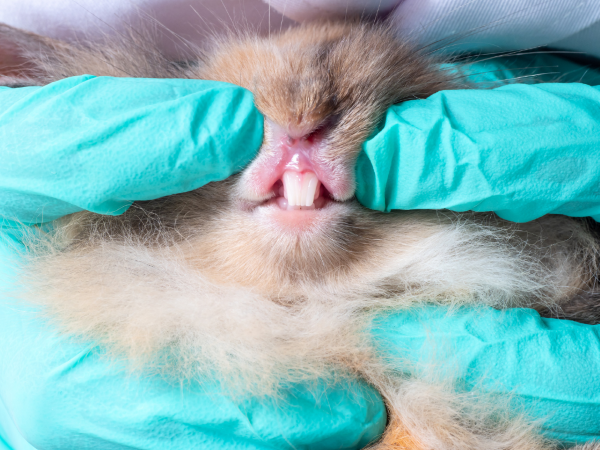Do you have a rabbit with teeth problems?
Many rabbits have upper and lower jaws that do not align properly. In fact, the most frequent issue for rabbits with teeth problems is a misalignment of teeth due to this jaw misalignment, known as malocclusion.
Teeth issues are a serious problem: Misaligned teeth do not wear properly and eventually the rabbit’s teeth, which never stop growing, become grossly overgrown and prevent the rabbit from eating as well or as much as it should.
This stresses and weakens the rabbit, which weakens the rabbit’s immune system, which leads to disease and demise. Eventually teeth related health problems may evne lead to the rabbit’s death!
How Many Teeth Does Rabbit Have?
A rabbit has 28 teeth, with a teeth structure or layout as follows:
Top Jaw is 16 teeth; 8 on each side.
- 4 Incisors (two on either side of the midline)
- 0 Canine
- 6 Pre-Molars (3 on either side)
- 6 Molars (3 on either side)
Bottom Jaw is 12 teeth; 6 on each side.
- 2 Incisors (one on either side of the midline)
- 0 Canine
- 4 Pre-Molars (2 on either side)
- 6 Molars (3 on either side).
The 6 incisors in the front of the rabbit’s mouth are used for cutting and clipping, grass, hay, stems and twigs. The incisors are like chisels. These six teeth are the only rabbit teeth we typically see!
The 10 pre-molars and 12 molars are called the cheek teeth because the align along the rabbit’s cheeks. These cheek teeth are used for grinding up food. We typically do not see any of the cheek teeth unless we deliberately open the rabbit’s mouth and look for them.
Veterinarians and scientists have recorded up to 120 jaw movements per minute while rabbits chew their food, a suprising amount as rabbits can not see directly in front of their mouths. Their lips and whiskers help them adeptly manipulate their food and chew properly!

Rabbits With Dental Problems
Too many owners do not realize that they have a rabbit with teeth problems and assume that their rabbits have healthy rabbit teeth.
But never forget that rabbits need a periodic health check just like any other pet or livestock.
Frequently, owners realize one of their rabbits has a teeth problem only when the rabbit appears to be sick – at this point the rabbit is already suffering and tremendously stressed!
Worse case is if the rabbit has stopped eating, because GI Stasis may set in and the rabbit may die. We recommend that all rabbit owners check their rabbit’s teeth as part of a periodic overall health check; like humans getting a physical.
In this video a veterinarian explains How To Check A Rabbits Teeth and How To Check A Rabbit’s Back Teeth and How To Tell If Your Rabbit Has Teeth Problems
Rabbit Teeth Problems – The Most Frequent Rabbit Dental Problems
Here is a list of the most common rabbit teeth problems:
- Rabbit teeth long and rabbit teeth overgrown – Rabbit teeth that overlap are also too long or overgrown rabbit teeth and are sometimes referred to as rabbit wolf teeth. If your rabbit’s teeth are normal, then their teeth will naturally wear down while they eat their high fiber diet. The high fiber diet is abrasive on the rabbit’s teeth and wears the teeth down as the teeth grow, so that they do not become overgrown and cause health problems. In most cases, rabbit teeth are worn down as the rabbit eats hay.
- Rabbit teeth malocclusion – occlusion is alignment… malocclusion means misaligned teeth. Misaligned teeth do not wear down properly, they become too long and overgrown.
- Rabbit teeth broken – A rabbit tooth may be broken because the rabbit ran into something or bit into something hard that broke its tooth. If the root is not damaged, then the tooth will likely grow out from the root. In time the tooth may be working again.
- Rabbit teeth burring and Rabbit Teeth spurring – Again, if there is a misalignment then one side or ridge of a tooth does not wear properly, continues to grow and creates a burr or spur that may pinch or cut into the rabbit’s cheek or tongue.
Rabbit Teeth Overgrown
The most common issue for rabbits with teeth problems is overgrown teeth due to malocclusion.
Rabbits with teeth problems will not eat well and are likely to eventually become malnourished. Poor nourishment leads to stress and a weak immune system, with these conditions often spiraling downward quickly towards death.
Malocclusion can lead to damaged roots, restricted blood flow, bacterial infections and abscesses – please check your rabbits’ teeth!
This MediRabbit.com article covering Rabbit Dental Diseases and Rabbit Dentistry provides great pictures and drawings for rabbit dental care.
Rabbit Teeth Never Stop Growing
That is right, rabbit teeth never stop growing throughout the rabbit’s life.
This is an important fact for all rabbit owners, homestead or pet, to realize as it will help guide decisions regarding your rabbits’ mouth and teeth health.
Why Do Rabbit’s Teeth Grow?
Rabbit teeth are open rooted, meaning they never stop growing.
This has been a biological advantage for them as they do so much chewing on high fiber foods. If rabbits’ teeth did not keep growing they would wear their teeth down to the gums.
Check this out: rabbit teeth can grow 3 to 5 inches each year!

Why Do Rabbits Have Teeth Problems?
Some veterinarians believe that domestic rabbits have been inbred too much, and that this can lead to teeth problems. Additionally, domestic rabbits are generally not culled due to their weaknesses while wild rabbits naturally are.
The inbreeding and the lack of culling for natural weaknesses exacerbates and perpetuates further dental weakness in the domestic rabbit breeding stock.
In turn, this creates some weaknesses in the gene pool. Rabbit teeth seems to be one of the weaker rabbit genes in the domestic breeding stock.
Below, we’ve embedded two Videos that Explain how to check on and care for Rabbit’s teeth.
Our take-away advice from this video is to become familiar with your rabbit’s jaw line, so that you can feel any differences developing such as abscesses in the jaws and molars.
This video also shows us how to check a rabbit’s teeth and what rabbit teeth should look like.
This video by Pittsburgh Zoo showcases a zoo veterinarian discussing germane rabbit teeth issues, such as points and burrs on rabbit molar teeth, and how to fix them by filing down rabbit teeth.
Corrective Solutions for Rabbit Dental Issues
Rabbit teeth filing – The cost of rabbit teeth filing will vary from veterinarian to veterinarian.
Rabbit Teeth Clipping and Rabbit Teeth Trimmers – Sometimes the rabbit teeth clippers or rabbit teeth trimmers are used to shorten the teeth of a rabbit whose teeth are growing too long.
Again, one alternative is to clip your rabbit’s teeth or have your veterinarian do some rabbit teeth trimming. Ensure that clippings and trimmings do not fall back into your rabbit’s mouth and throat. Many veterinarians will advise owners to have misaligned rabbit teeth extracted.
This embedded video showcases Rabbit Teeth Trimming, Cutting, Clipping, and Filing.
What Do Rabbit Teeth Look Like?
If a picture paints a thousand words, then a video is worth ten thousand words. It is an excellent view of Rabbit Teeth Surgery performed by a qualified veterinarian.
This video of rabbit teeth surgery also provides great views of a rabbit tongue and lips and shows that rabbit teeth have very long roots.
The teeth roots in the upper jaw go right up to the eye socket and sinus cavity. This makes operating on rabbit teeth more of a risk than people think!
Further, rabbit tooth infections, cracks, or breaks can cause abscesses in the rabbit’s jaw. The infection in the abscesses can then spread to the rabbit’s eyes, ears, or nasal cavity.
Rabbit teeth extraction by surgery – The removal of rabbit teeth is a last resort, but often enough is required to provide the best quality of life for a rabbit. As shown in the Rabbit Teeth Surgery video above, extracting teeth requires that the rabbit be sedated by a veterinarian.
Final Thoughts
As we’ve discussed, a rabbit’s teeth are key to its health and survival.
They have unique, open rooted and keep growing all the time. This usually isn’t an issue, as rabbit teeth are worn down by all the abrasive chewing of high fibers daily!
But it is common for domestic rabbits to have teeth problems.
These dental issues can really plague a rabbit, causing malnutrition, stress and weakening of the immune system which may ultimately lead to death. So we highly recommend owners to periodically and proactively perform a health check on their rabbits, including checking their teeth.
Finally, always talk with your local veterinarian if in need of help trimming, clipping, cutting, filing, or shaving your rabbits’ teeth.
And don’t forget to check out the imbedded videos, they are excellent and really provide a good view of rabbit dental issues and what can be done to help a rabbit with troubled teeth!

